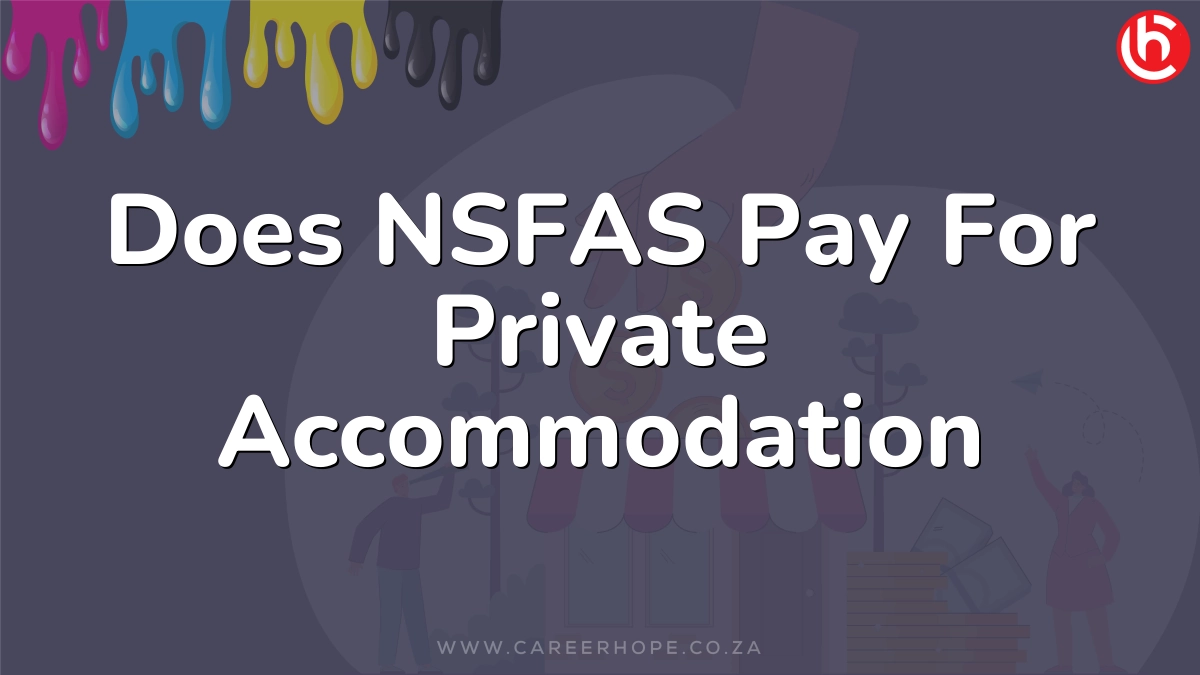The National Student Financial Aid Scheme (NSFAS) provides financial assistance to eligible students in South Africa, covering various expenses, including accommodation costs. One of the key questions that often arises is whether NSFAS pays for private accommodation. The answer is yes, NSFAS does offer a housing allowance for students living in approved private accommodations, subject to certain conditions and limitations.
Contents
NSFAS Private Accommodation Allowance
According to the guidelines set by NSFAS, students residing in approved private accommodations are eligible for a capped housing allowance. The maximum amount varies based on the location of the institution. In metropolitan areas, the allowance can be up to R50,000 annually, while in other regions, it is capped at R41,000 per academic year. This allowance is applicable to both university students and students enrolled at Technical and Vocational Education and Training (TVET) colleges.
It’s important to note that each student is eligible for only one type of accommodation allowance per academic term. This means that if a student is already receiving an allowance for university or TVET college residence, they cannot claim an additional allowance for private accommodation during the same period.
Exceptions and Special Cases
TVET College students registered for occupational qualifications may qualify for allowances only if they are in simulated training. However, if they have an employment contract and are receiving a stipend, they do not qualify for NSFAS allowances.
Distance learning students are not eligible for any accommodation allowance from NSFAS. This is because the financial aid scheme primarily supports students attending classes on-campus or in-person.
Accommodation Requirements and Additional Allowances
NSFAS or the institution will determine the maximum amount for the accommodation if it lacks certain services or amenities. For instance, if the accommodation does not provide internet access, NSFAS will grant students a monthly allowance equivalent to R2,000 per year to cover data expenses. Similarly, if the accommodation cannot ensure consistent water and electricity supply, students receive an annual utility allowance of R5,000 directly from NSFAS.
It’s crucial to note that NSFAS funding is subject to various eligibility criteria, including being a South African citizen, pursuing an approved qualification, and meeting the household income threshold. The income threshold is currently set at R350,000 for able-bodied students and R600,000 for students living with disabilities.
People Also Ask
How do I apply for NSFAS funding?
To apply for NSFAS funding, you need to complete the online application process through the NSFAS website or at your institution’s financial aid office. Ensure that you meet the eligibility criteria and provide all the required documentation, such as proof of income and academic records.
Can I receive NSFAS funding for the entire duration of my studies?
NSFAS assesses your eligibility for funding on an annual basis, taking into account your financial and academic performance. As long as you continue to meet the requirements, you can receive NSFAS funding for the duration of your approved qualification.
What if my landlord doesn’t provide utility bills or internet access?
If your private accommodation lacks certain services like internet access or consistent water and electricity supply, NSFAS has provisions to provide you with additional allowances to cover these expenses. Make sure to communicate any such issues to NSFAS or your institution’s financial aid office.
Can I receive NSFAS funding if I’m a distance learning student?
Unfortunately, distance learning students do not qualify for any accommodation allowance from NSFAS. The financial aid scheme primarily supports students attending classes on-campus or in-person.
What is the maximum household income to qualify for NSFAS funding?
The current household income threshold to qualify for NSFAS funding is R350,000 for able-bodied students and R600,000 for students living with disabilities. This threshold is subject to change, so it’s advisable to check the latest guidelines on the NSFAS website.
By understanding the NSFAS guidelines for private accommodation and other allowances, students can make informed decisions about their living arrangements and ensure they receive the financial support they are eligible for. It’s always recommended to stay updated with the latest information and consult with your institution’s financial aid office for specific queries or assistance.

